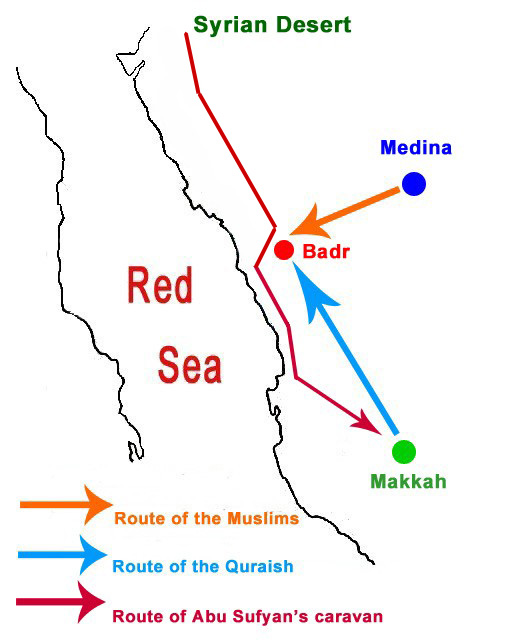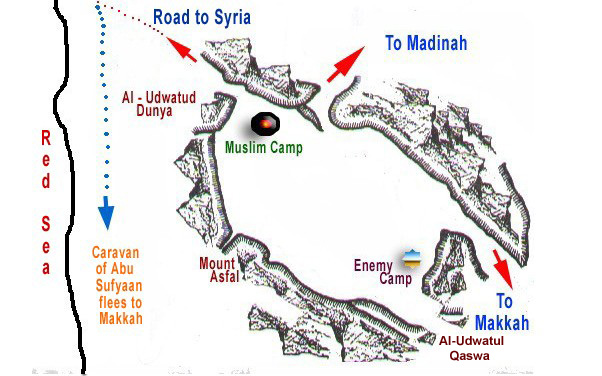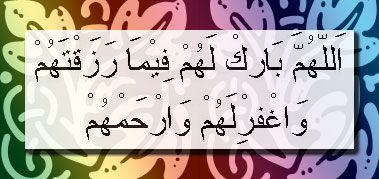
The Biography of
Muhammad Sallallahu Alaihi Wasallam
Compiled and presented by

| Lesson 16 | ||||||||||||||||
| The Battle of Badr It was common knowledge in Makkah and Madinah that Abu Jahl was planning an attack against the Muslims. He incited the Quraish to avenge the death of Amr Ibn al-Hazramee at Nakhla. At the beginning of Ramadhaan, the Prophet Sallallahu Alaihi Wasallam called a meeting of the Muslims and informed them that a Quraishi trading caravan, led by Abu Sufyaan, heavily laden with goods was returning to Makkah from Syria. Since a full scale battle was not expected, the Prophet Sallallahu Alaihi Wasallam left Madinah on the 12th Ramadhaan with three hundred and thirteen ill-equipped Sahabah Radhi Allahu Anhum, seventy camels and two horses. Two or three Sahabah Radhi Allahu Anhum took turns to ride on each camel. The Prophet Sallallahu Alaihi Wasallam also walked at times despite the pleadings of his Sahabah. In the meantime some travellers informed Abu Sufyaan that the Muslims were approaching in his direction. He hastily sent a courier to Makkah with the message that the Prophet Sallallahu Alaihi Wasallam was on his way to intercept and attack him and that the Quraish should rush to his aid if they wished to save the caravan. There was an uproar in Makkah when the message was received by the Quraish. Nearly every family had invested their wealth in this particular trade mission as their aim was to use the entire profits to prepare for a war that would crush the Muslims forever. Abu Jahl, the sworn enemy of the Muslims, prepared an army of a thousand well-equipped warriors, with seven hundred camels and three hundred horses. True to the Arab tradition, the Quraish left Makkah with great pomp and ceremony, with women to cheer and entertain them and drummers to stir their fighting spirits. They carried along with them other items of luxury and comfort as they planned to spend three days of feasting, entertainment and merry-making before setting upon the Muslims. Faithfulness of the Ansaar When the Prophet Sallallahu Alaihi Wasallam turned towards Badr to intercept Abu Sufyaan, he received the fearful news of the presence of Abu Jahl with his formidable army. The Prophet Sallallahu Alaihi Wasallam held consultations with the Sahabah Radhi Allahu Anhum as the odds were overwhelmingly against the Muslims. Abu Bakr, Umar and the other Muhajireen Radhi Allahu Anhum spontaneously declared their devotion to the Prophet Sallallahu Alaihi Wasallam and pledged to fight beside him. The Ansaar were also devoted and loyal, but the Prophet Sallallahu Alaihi Wasallam wanted to assess their mindset in such an urgent crisis. Miqdaad Ibn Aswad Radhi Allahu Anhu of the Ansaar said: “O Prophet of Allah, we are at your service. We are not cowards, frightened or unfaithful like the tribe of Isra’eel who said to Moosa when called upon to fight in the path of Allah : ‘Go you and your Lord and fight. We will sit here’. We will fight to the right of you, to the left of you, in front of you and behind you”. Sa’ad Ibn Muaz Radhi Allahu Anhu said: “Perhaps you asked our Ansaar counsel because we originally offered to defend ourselves only if attacked in Madinah. We care not for what we promised then. We stand by you to do whatever you ask us to do. By Allah, if you go ahead until you reach Bark Ghimdaan (a far off place in Yemen or Abysinnia), we will accompany you. Command us to jump into the sea, we will not hesitate. The enemy shall not get at you, without stepping over our dead bodies”. (1) The Prophet Sallallahu Alaihi Wasallam was impressed with the loyalty and sacrifice of his Sahabah at this critical juncture. Enthusiasm of the youngsters Those who were too young were sent back as the mission was dangerous. Umair Ibn Abi Waqaas, a boy of tender age, was told to return. He burst into tears and the Prophet Sallallahu Alaihi Wasallam finally allowed him to participate in the mission. When Abu Sufyaan reached Badr he knew the Muslims were close by and immediately he changed direction and followed the route close to the sea. He sent a second message to the Quraish that he was safely on his way and that the Quraishi army should return to Makkah. |
||||||||||||||||
 |
||||||||||||||||
| March to Badr | ||||||||||||||||
|
Preparation for the battle When the Quraish received Abu Sufyaan’s second message there was a difference of opinion in the camp whether to proceed to Badr and fight the Muslims or to return to Makkah now that their caravan was safe from a Muslim attack. Many Makkans wanted to return but Abu Jahl was persistent. His heart was filled with revenge and he made it known that nothing would satisfy him more than seeing the end of Islam and the death of the Prophet Sallallahu Alaihi Wasallam. At Badr the armies camped. The Quraish, having reached first, occupied the better position. The Muslims did not have a water source and the land on their side was so sandy that the camels sank into it. Hubab Ibn Mundhir Radhi Allahu Anhu asked the Prophet Sallallahu Alaihi Wasallam whether his choice of position was by divine inspiration. When he was told that it was not he suggested that the Muslims move forward and take possession of the spring in front of them. The Prophet Sallallahu Alaihi Wasallam accepted the suggestion. That night rain fell on both sides. For the Muslims it was a blessing as this brought fresh water to them and also made the sand firm beneath their feet. However, being the kind-hearted prophet that he was he allowed the enemy to gather water from the Muslim camp. For the Quraish the rain caused the land to become muddy and made movement difficult. In the Muslim camp, a booth of palm branches was erected for the Prophet Sallallahu Alaihi Wasallam on an elevation overlooking the battlefield. The Prophet Sallallahu Alaihi Wasallam then pinpointed the exact spots where the Quraishi leaders would fall. His prediction was found to be perfectly true after the battle. (2) |
||||||||||||||||
 |
||||||||||||||||
| Battlefield of Badr | ||||||||||||||||
| The Prophet Sallallahu Alaihi Wasallam prays to Allah At nightfall, no Muslim dared to think of sleep knowing well the type of treachery the enemy was capable of. The Prophet Sallallahu Alaihi Wasallam spent the night in meditation and prayer, entreating for the help of Allah and for the victory of the Muslims. He knew that the Muslims were weaker in number and weapons and if he relied on this he could never win. The battle commences The next morning was the 17th Ramadhaan. The Prophet Sallallahu Alaihi Wasallam arranged the military formation of his small army. In true Arab tradition, three of the Quraishi warriors, Utbah Ibn Rabi’ah, Shaibah Ibn Rabi’ah and Waleed Ibn Shaibah Ibn Rabi’ah advanced into the open space which divided the Muslims from the idolaters. They challenged three warriors from the Muslim ranks in single combat. Auf Ibn Ufra, his brother Muawwaz and Abdullah Ibn Rawaha Radhi Allahu Anhum came out to face them. When Utbah Ibn Rabi’ah realised that the three warriors were from the Ansaar, he shouted: "O Muhammad, send three Quraishi warriors to face us". The Prophet Sallallahu Alaihi Wasallam instructed his uncle Hamza Ibn Abdul Muttalib Radhi Allahu Anhu to fight Utbah, Ubaidah Ibn Harith Radhi Allahu Anhu to fight Shaibah and Ali Radhi Allahu Anhu to fight Waleed Ibn Shaibah. In a quick encounter the three disbelieving Quraishi soldiers were killed. Then began a pattern of general fighting. The odds were so great that one Muslim had to fight against three skilled and well-armed Quraishi soldiers. Divine Assistance The Prophet Sallallahu Alaihi Wasallam beseeched Allah : "O Allah, should this small group of believers perish this day, no one will be left on this earth to worship you and to carry your message to the world". He was so absorbed in his supplications that his mantle fell from his shoulders. Abu Bakr Radhi Allahu Anhu was there to console him. By divine command Jibra’eel Alayhis Salaam advised the Prophet Sallallahu Alaihi Wasallam to take a handful of sand and throw it in the midst of the enemy. This resulted in the non-Muslims fleeing in all directions. It was a divine victory for the Muslims. Bravery of two young brothers Two very young Muslim youths from the Ansaar, Muaz Ibn Ufra and Muaz Ibn Amr Ibn Jamooh Radhi Allahu Anhuma had taken a vow to kill Abu Jahl. They had strong feelings of dislike for Abu Jahl as he had treated the Prophet Sallallahu Alaihi Wasallam extremely badly. Abdur Rahman Ibn Auf Radi Allahu Anhu says : "I was fighting on the day of Badr when I saw two very young boys on my right and left. Suddenly one of them asked : "O my uncle! Show me Abu Jahal. I said "O my brothers son. What have you to do with him? He answered : "I have vowed to Allah that I shall kill him when I see him or I shall be killed by him. The other youngster spoke in a similar manner to me. I pointed him out to them and they attacked him like two hawks and struck him down. They were sons of Ufra." The Prophet's Sallallahu Alaihi Wasallam mind at this stage was preoccupied with the fate of Abu Jahl rather than with that of his other enemies. The Prophet Sallallahu Alaihi Wasallam asked someone to find him. Abdullah Ibn Mas’ood Radhi Allahu Anhu went out in search and found him in the midst of a pile of corpses. He was still breathing. Abdullah Ibn Mas’ood Radhi Allahu Anhu placed his foot on the dying enemy’s neck and said: "O enemy of Allah! See how Allah has humiliated you". He was about to sever his neck when Abu Jahl shouted: "Have you ever seen a noble fellow as I murdered by such a simpleton like you?" Abdullah Ibn Mas’ood cut off his head and brought it to the Prophet Sallallahu Alaihi Wasallam. At the sight of the bloodstained face of his enemy the Prophet Sallallahu Alaihi Wasallam exclaimed: "Surely, this man was the detestable Pharaoh of his nation". When the day drew to a close the Muslims had won and the bodies of the Quraish lay trampled in the dusty desert sands of Badr. Allah explained this in the Quran : Allah granted you victory in Badr when you were a weak little force. So fear Allah that you may be grateful." (Surah Al-Imraan, verse 123) The Prophet Sallallahu Alaihi Wasallam remained on the battlefield of Badr for three days to bury the dead and gather together the spoils of war. The Muslims lost fourteen men : six Muhajireen and eight Ansaar. How honoured they were to earn the eternal glory as the first martyrs in Jihaad! Seventy non-believers were killed and an equal number were taken captive. The dead bodies of the disbelievers were gathered and buried in a dried up well. (Bukhari) Treatment of the prisoners On reaching Madinah, the Prophet Sallallahu Alaihi Wasallam gave the issue of the prisoners top priority. Contrary to all customs of the Arabs, the prisoners were treated with the greatest respect. The Prophet Sallallahu Alaihi Wasallam gave strict orders that they should be treated with kindness. The Sahabah Radhi Allahu Anhum, to whose care he entrusted them, faithfully obeyed his instructions. Those of the prisoners who had no clothes were provided with dress and they were fed on par with the Muslims. They shared their own food with the prisoners giving them bread which formed the best part of their meals satisfying themselves with dates alone. A Quraishi prisoner in later days remarked: “Blessings be on the men of Madinah. They gave us wheaten bread to eat when there was little of it contending themselves with dates”. Ransom for the prisoners The prisoners were released on payment of a ransom according to their means. Abbas Ibn Abdul Muttalib was a wealthy prisoner and he paid the highest ransom for his freedom. Others who could not pay were set free without payment. Some of the poor prisoners were literate and they were given their freedom provided they each taught ten children of the Ansaar how to read and write. Zaid ibn Thaabit Radhi Allahu Anhu, a scribe of the Quran, was one of those who were taught by the captives. Among the prisoners was Abul As Ibn Rabi'ah, who was the son-in-law of the Prophet Sallallahu Alaihi Wasallam. Zainab, the daughter of the Prophet Sallallahu Alaihi Wasallam, was asked to send his ransom from Makkah for his release. When the ransom was received, the Prophet Sallallahu Alaihi Wasallam found the necklace that Khadija Radhi Allahu Anha had given her daughter on her marriage. The Prophet Sallallahu Alaihi Wasallam was so grieved that he requested the Sahabah Radhi Allahu Anhum, if they agreed, to release his son-in-law without ransom. They agreed happily and Abul As Ibn Rabi'ah was freed. In due course he embraced Islam. Effects of Badr The Muslims returned victorious from Badr with increased confidence. The Prophet's Sallallahu Alaihi Wasallam prestige rose and people now began accepting Islam. The enmity of the Jews was, however, further increased. The Muslims rejoiced and congratulated the Prophet Sallallahu Alaihi Wasallam and his Sahabah on the victory that Allah had given them. When the news of defeat reached Makkah there was gloom and every house went into mourning. (3) |
||||||||||||||||
Lessons to learn
|
||||||||||||||||
_______________________________________ (1) Nadwi, Syed Ab al-Hasan Ali, Muhammad Rasulullah, Lucknow, 1982, p. 201 (2) Nadwi, Syed Ab al-Hasan Ali, Muhammad Rasulullah, Lucknow, 1982, p. 205 (3) Mubarakpuri, Safi-ur-Rahman, Ar-Raheeq Al-Makhtum, Riyadh, 2000, p. 227-228 ___________________________________
|
||||||||||||||||
Dua for the host after an invitation
Meaning : O Allah bless them in what you have given them to eat, forgive them and have mercy on them. |
Sunnah A departing guest should be seen off till one's door. (Ibn Majah) |
|||||||||||||||

